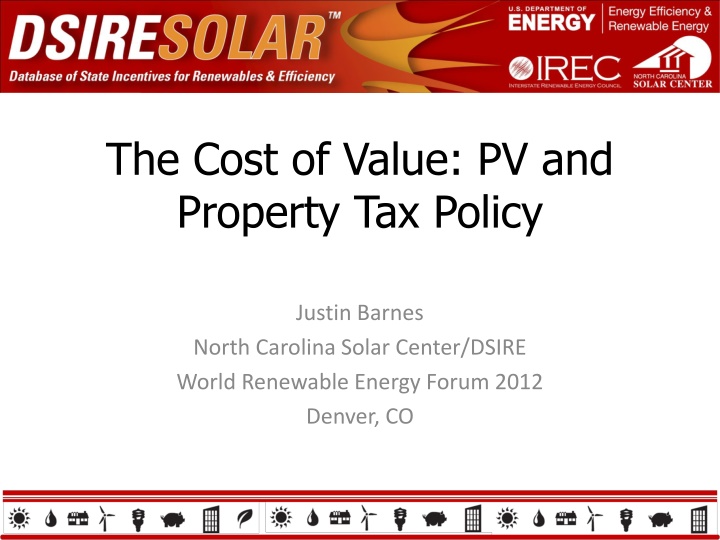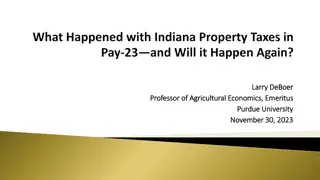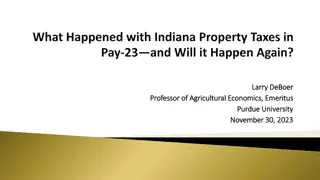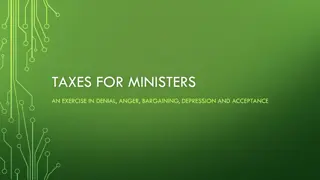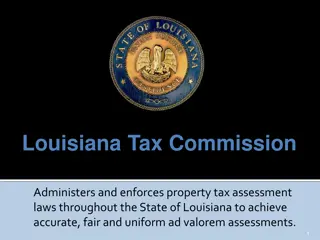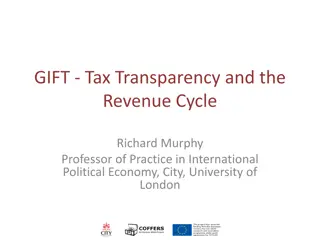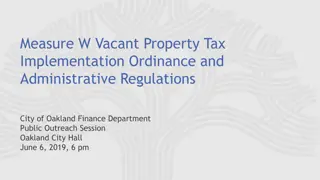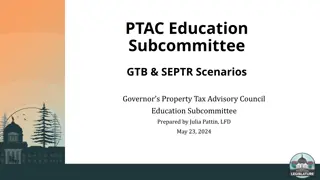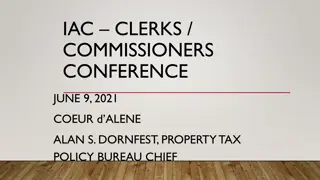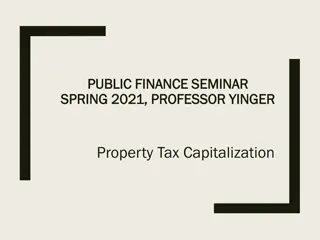Property Tax Policies and Solar PV Value Assessment Overview
This content provides an in-depth look at the property tax policies related to solar photovoltaic (PV) systems, including valuation methods, exemptions, assessment rates, and current practices in different U.S. states. It covers major determinants of taxation, such as real vs. personal vs. utility property classification, and highlights specific policies and practices in states like Arizona, California, Maryland, and more.
Uploaded on Oct 09, 2024 | 2 Views
Download Presentation

Please find below an Image/Link to download the presentation.
The content on the website is provided AS IS for your information and personal use only. It may not be sold, licensed, or shared on other websites without obtaining consent from the author.If you encounter any issues during the download, it is possible that the publisher has removed the file from their server.
You are allowed to download the files provided on this website for personal or commercial use, subject to the condition that they are used lawfully. All files are the property of their respective owners.
The content on the website is provided AS IS for your information and personal use only. It may not be sold, licensed, or shared on other websites without obtaining consent from the author.
E N D
Presentation Transcript
The Cost of Value: PV and Property Tax Policy Justin Barnes North Carolina Solar Center/DSIRE World Renewable Energy Forum 2012 Denver, CO
Property Tax 101 Times Assessment Rate Classification (Exemption??) Full Cash Valuation TAXES OWED Times Tax Rate Assessed Value
Major Determinants of Taxation Classification: Real vs. personal vs. utility property Breadth of PV exemption or assessment laws (or lack there of) Central or local assessment Assessment method used (comparable sales, replacement cost, income capitalization)
Current Practices: 15 States State Exemption or Equivalent Other Policy/Properties Other Methods/Notes Valued at 20% depreciated cost (30-yr SL, 10% floor); 20% assessment rate Assessment rate for utility and industrial property varies from year to year Arizona All behind the meter systems are exempt Exclusion lost at change in PV property ownership; sale leasback and flip do not trigger Larger than 2 MW-AC uses income approach equalized to cost approach with standard values No set depreciation schedule, but commonly 25 - 30 years; FL PSC schedule is 30 years Value excluded for locally assessed properties Utility or very large scale projects are centrally assessed (no exclusion) California Residential behind the meter systems exempt, including third-party owned up to 100 kW 2 MW-AC or less locally assessed at value of $1,008/kW and 20-yr economic life; 29% assessment rate Residential typically real property; non- residential typically personal property (cost and/or income) Colorado Florida No statewide policy All counties have local exemptions for behind the meter systems, 25% exports permitted County practices vary; some counties offer additional exemptions for wholesale Cost approach typically used where exemption does not exist Hawaii Law unclear, but all behind the meter systems appear to be exempt Special assessment may apply to wholesale; personal vs. real property likely important No business personal property tax; 33.3% assessment ratio Illinois Wholesale gets 50% exemption; valued at depreciated cost (30-yr SL, 25% floor) Local property tax credits exist in several counties (typically limited to residential) Maryland All behind the meter systems are exempt 20-yr exemption for behind the meter systems located on taxable property Non-exempt systems likely cost approach; no standard depreciation. For wholesale, some components may be assessed as real property Massachusetts
Current Practices: 15 States State Exemption or Equivalent Other Policy/Properties Other Methods/Notes Typically locally assessed; abatements seeking personal property classification denied Valued at depreciated cost (1.5% annually for 50 years); 10+ MW get 55% abatement for 20 years Nevada All behind the meter systems are exempt No business personal property tax; wholesale facilities likely mostly personal property Pending legislation would apply $7,000/MW standard rate for wholesale facilities New Jersey All behind the meter systems are exempt Residential systems not treated as physical improvement, therefore exempt All other PV assessed centrally using depreciated cost (20-yr SL, 20% floor); 33.3% assessment rate Residential exemption lasts only until change is home ownership New Mexico Residential behind the meter exempt; local option 15-yr exemption for other facilities or PILOT If opted-out, no personal property tax, but one ORPTS opinion called wind farm real property No apparent ownership or on-site use requirements for 15-yr local option New York Utility-owned centrally assessed using composite; 80% exemption applied to cost method Residential behind the meter exempt as non- business personal property Valued at depreciated cost (18-yr SL with inflation added, 25% floor); 80% of appraised value exempt North Carolina PILOT of $7,000 - $9,000/MW for non-exempt systems placed in service by 2013 Additional requirements for PILOT if facility is 5 MW or larger Ohio All systems 250 kW-AC or less exempt For residential, no comparable sales. Non- residential may be commercial equipment (exempt) Wholesale likely income capitalization, unless considered commercial equipment Pennsylvania No statewide policy so local variation possible
Financial Implications: Examples OH (PILOT at $7,000/MW): $6 7/MWh (slightly backloaded due to production declines) CO ($1,008/kW value, 20-yr life, 29% assessment rate, varied mill rates): Avg. MW rate = $9,000 - $20,000 /MW (front-loaded) Avg. MWh rate = $6 14/MWh (front-loaded) NJ (Value of BTM exemption using replacement cost w/20 yr. SL depreciation, 20% floor, 1.89% avg. tax rate) Avg. MW rate: $67,000/MW (front-loaded) Avg. MWh Rate: $58/MWh (front-loaded)
Issues to Consider Is the use of replacement cost appropriate? How do you incorporate REC income using income capitalization? (intangible personal property?) Do REC sales = income producing property? Virtual net metering and on-site use requirements? What is a conventional system in the context of PV? Does a lease jeopardize public purpose tax-exempt status?
Questions?? Justin Barnes North Carolina Solar Center justin_barnes@ncsu.edu
